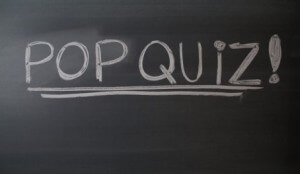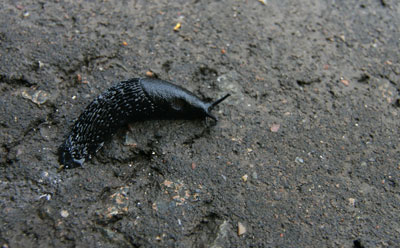Pop Quiz: Guess the Connotation
 Pop Quiz!
Pop Quiz!
Because the GRE is a computer-adaptive test, chances are you’re going to see words you don’t know. When that happens, one useful strategy is to try to ferret out whether the unknown words have positive or negative connotations. You can do this using roots, your knowledge of similar words in English or Romance languages, or just your “gut” feeling.
Decide whether each word is positive, negative, or neutral, then click “more.”
MERETRICIOUS
CROTCHETY
MAGNANIMOUS
CAJOLE
TERRIGENOUS
DULCET
Visual Dictionary: Clandestine
Welcome to Visual Dictionary, a series of posts about words that are better expressed in pictures.

Perhaps this fellow is incognito because he has
some clandestine business to attend to.
While clandestine means “secret,” it’s not a secret that the clandestine arm of the CIA is called the National Clandestine Service.
Some other words for “secret” are furtive and surreptitious.
While clandestine and furtive have similar meanings, furtive has a somewhat negative connotation. People have clandestine romantic affairs, but they furtively snoop through someone else’s email.
Visual Dictionary: Unctuous
Welcome to Visual Dictionary, a series of posts about words that are better expressed in pictures.
 This guy is unctuous.
This guy is unctuous.
He’s trying to sell you a used car with 250,000 miles on it, and telling you that, if you don’t like the car, you’ll easily be able to resell it for a profit on the internet, and also the car is a total babe magnet. Doesn’t this guy look like he would say “babe magnet”? Unctuous.
Slugs are often thought to be unctuous.

Seriously unctuous.
Unctuous means greasy or oily, like an unguent. But we often use the word as a metaphor. That guy with the phone — kind of gross, right? It’s like he’s sliming your brain.
Bill’s unctuous uncle called him up asking for money. “Look, nephew … I know I haven’t called you since you were six, but I’ve got this unguent business, and I just need a few thousand bucks to get it off the ground, and also pay my rent. I’ve always liked you better than your cousins.”
Bill wasn’t that gullible. He told his unctuous uncle, “I don’t want any part of your unguent business.”
Pop Quiz: Let’s Make Groups
 Pop Quiz!
Pop Quiz!
The following six words can be grouped by meaning into two categories.
Mentally place them into two synonym groups, then click “more.”
AUGMENT
DISSEMBLE
DISSIMULATE
AGGRANDIZE
DISINGENUOUS
COMPOUND
Visual Dictionary: Sagacious
Welcome to Visual Dictionary, a series of posts about words that are better expressed in pictures.
 This monk is sagacious.
This monk is sagacious.
Sagacious is the adjective form of sage, a wise person. A wise person is sapient (like Homo sapiens).
A very perceptive person could be called sharp, astute, perspicacious, or canny.
An educated person is erudite; an intellectual person is cerebral.
Let’s try an Antonyms problem:
PERSPICACIOUS:
A. inept
B. ambivalent
C. tepid
D. tantamount
E. opaque
Choose your own answer, then click “more.”
Three-Letter Words: Pat
 Some of the most perplexing words on the GRE are diminutive. Who doesn’t see PAN : REVIEW and metaphorically scratch his or her head, or wonder what, exactly, a nib or a gin is on its own? Welcome to Three-Letter Words. A few of them might make you want to deploy some four-letter words.
Some of the most perplexing words on the GRE are diminutive. Who doesn’t see PAN : REVIEW and metaphorically scratch his or her head, or wonder what, exactly, a nib or a gin is on its own? Welcome to Three-Letter Words. A few of them might make you want to deploy some four-letter words.
Of course you can pat someone on the head, give someone a pat on the back, or use a pat of butter. You can also have something down pat.
But what does it mean when someone gives you a pat answer? As it turns out, pat can mean apt or right to the point, but it can also mean glib or facile. Thus:
I tried to help her get started with her philosophy paper by asking her “What is virtue?” Her answer was a little too pat: “It’s whatever the best qualities are.”
Complicated questions deserve more than pat answers. The answer to homelessness isn’t “build more homes.” Rather, a host of interrelated factors create the circumstances that cause homelessness in the first place.
Choose your own answer before clicking “more”:
PAT:
A. insipid
B. rueful
C. penetrating
D. sidereal
E. permeable
Visual Dictionary: Hedonist
Welcome to Visual Dictionary, a series of posts about words that are better expressed in pictures.
There is no dearth of English words for seekers of pleasure. Sybarite and voluptuary are pretty good synonyms for hedonist. A sensualist is a person given to indulging the senses and appetites.
There are many more words expressing similar ideas, but with notable differences. For instance, an oenophile is a connoisseur of wines, but a carouser is a drunk.
Epicure, epicurean, gastronome, and gourmand all mean “lover of fine food and wine.” A glutton is a person who eats too much.
These words have negative connotations:
Debauchee – a debauched person, “addicted to excessive indulgence in sensual pleasures”
Lecher – as one GRE student put it, “It means perv.”
Libertine – a person who is morally or sexually unrestrained
Rake – “a dissolute or profligate person, esp. a man who is licentious”
And finally, wanton, bacchanalian, and dionysian are related adjectives.
Wanton has the sense of totally letting yourself go, which makes it a nice word for the covers of romance novels, but it can also pop up in the sense of “wanton violence” or “wanton disregard for human life.”
The GRE instructor hesitated when asked what bacchanalian means: there is not a dictionary definition in the world that doesn’t contain the word “orgiastic.”
You wouldn’t believe what that guy suggested on the first date — and before we’d even gotten our appetizer. When I reminded him of the place’s “No Shirt, No Shoes, No Service” policy, he rolled his eyes and suggested the same thing to our waitress. What a rake.
It took months before she came up with the perfect name for her burlesque-themed Asian broth company: Wanton Soup.
Easily Confused Words: Knell and Knoll
knell ≠knoll
Knell is often heard in the expression “death knell.” What is a death knell, exactly? It sounds awful! A knell is the sound of a bell being rung slowly, such as for a funeral. You can also use knell as a verb. “The bell knelled!” she yelled: we were late to the funeral!
A knoll, however, is a small, rounded hill. As in, the “grassy knoll” that was instrumental in the assassination of JFK. A synonym is for knoll is hillock.
Here is the grassy knoll on Elm Street in Dallas, Texas, where a witness claimed to have seen a man holding a gun prior to the shooting of President Kennedy.
 It doesn’t sound like as good of a conspiracy theory if you call it a “grassy hillock.”
It doesn’t sound like as good of a conspiracy theory if you call it a “grassy hillock.”
Three-Letter Words: Ken
 Some of the most perplexing words on the GRE are diminutive. Who doesn’t see PAN : REVIEW and metaphorically scratch his or her head, or wonder what, exactly, a nib or a gin is on its own? Welcome to Three-Letter Words. A few of them might make you want to deploy some four-letter words.
Some of the most perplexing words on the GRE are diminutive. Who doesn’t see PAN : REVIEW and metaphorically scratch his or her head, or wonder what, exactly, a nib or a gin is on its own? Welcome to Three-Letter Words. A few of them might make you want to deploy some four-letter words.
Ken isn’t just Barbie’s boyfriend. Ken means knowledge, understanding, or perception. It often occurs in the expression “beyond my ken.”
Don’t confuse ken with kin, meaning family or relatives.
Choose your own answer before clicking “more”:
As a scholar of Chinese dynasties and governments, three thousand years of history was well within his ken; even those who criticized his conclusions had to admit that his ___________ was _____________.
A. legerdemain … arcane
B. erudition … estimable
C. pedantry … prodigious
D. perspicacity … wan
E. sagacity … tantamount
Easily Confused Words: Gradation and Graduation
gradation ≠graduation
Graduation, of course, is what happens at the end of a course of study. Gradation, however, is any change or process taking place in stages, or gradually.
Something with gradations is gradated.
The dress showed a gentle gradation of color, beginning at the top with a robin’s egg blue and ending at the hem with a sea-foam green.
Some spelling bee manuals divide words into easy, medium, and difficult, but relative difficulty among spelling words is really far more gradated than those three categories would suggest.

